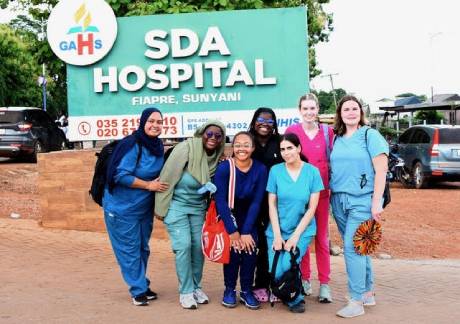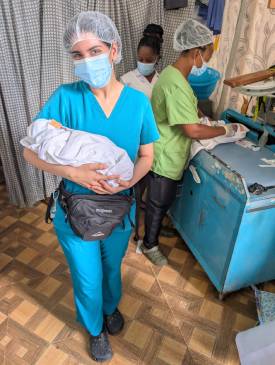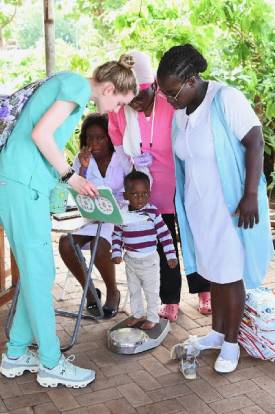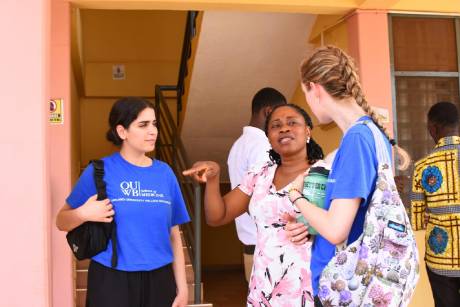Study abroad gives Oakland University students global perspective on public health issues
|
Students observed medical services at Seventh Day Adventist (SDA) Hospital in Sunyani, Ghana during a three-week study abroad this summer. |
A group of Oakland University students studied abroad in West Africa this summer, exploring how cultural values, economic systems and personal fears shape health care outcomes of vulnerable populations in the developing world.
Led by associate professor Kwame Sakyi and lecturer Heather Davies, from OU’s School of Health Sciences, the Public Health in Ghana program engages with community-based health providers to help students understand challenges of delivering care in a low-resource setting.
Students came from the School of Health Sciences, College of Arts and Sciences and the Oakland University William Beaumont School of Medicine (OUWB). They spent three weeks in Ghana, participating in community public health programs, observing medical services at a hospital, and visiting historical and cultural sites –experiences that led students to reflect on their roles as future health professionals.
|
Nedi Affas cradles a newborn delivered via C-section at SDA Hospital. |
“When I heard about the opportunity to travel to Ghana with a focus on public health, and women and children specifically, I felt it was a perfect fit,” said OUWB student Nedi Affas. “I’m interested in OBGYN, and this program gave me the chance to deepen that passion in a meaningful way. It was a way for me to grow into the kind of physician I want to be.”
At Seventh Day Adventist Hospital, in the city of Sunyani, Affas shadowed doctors who performed obstetric and gynecological services, including a Cesarean section and a myomectomy, a surgery to remove noncancerous growths that develop in the uterus.
“The myomectomy stood out because the patient had delayed care for a long time due to fear of losing her uterus,” said Affas. “In her community, the uterus holds deep cultural significance. It’s strongly tied to a woman’s identity and ability to conceive, and the fear of losing that part of herself kept her from seeking help sooner. That experience helped me better understand how personal and cultural beliefs influence health care decisions, especially for women.”
OUWB student Mackenzie Farrow observed a neonatal intensive care unit and pediatric ward, where doctors overcame resource shortages in creative ways, such as by fashioning a CPAP machine using a water bottle and straw.
“The hospital was so different from ones I’ve shadowed (in the U.S.),” said Farrow said. “There wasn’t a lot of access to certain resources, but that didn’t deter the physicians at all from providing the best care they were able.”
|
Mackenzie Farrow assists nurses at an SDA clinic that cares for infants and young children. |
Students saw the same spirit of resourcefulness when they visited a mobile community rehabilitation clinic that provides physical therapy services for children with cerebral palsy. The clinic is run by the Center for Learning and Childhood Development - Ghana, a nonprofit headed by Dr. Sakyi that supports children's survival and development.
“The staff teach families how to do some exercises at home and show them what they can use around the house, if they can’t afford braces,” Farrow said. “It was so inspiring to see the staff that works with the kids and cares so deeply about them and their families.”
The trip also included visits to historical sites such as Cape Coast Castle, which played a significant role in the transatlantic slave trade. Affas said that walking through dungeons where enslaved Africans were held, and hearing stories about their inhumane treatment, reinforced classroom discussions about the importance of treating people with dignity and respect.
“At OUWB, we have a robust ethics program, and one of our sessions focused on the concept of ‘otherness’ and how people are dehumanized when seen as fundamentally different,” she said. “Seeing this history up close gave me a much deeper understanding of what we had discussed in the classroom. It wasn’t just a historical site, it was a powerful reminder of how deeply human dignity matters, especially in the context of global health and social justice.”
|
Affas and Farrow learn about the Municipal Health Directorate in Sunyani, Ghana, which serves as a pivotal institution in the realm of public health and medical research within the region. |
Farrow said that seeing the dedication of health care providers in Ghana has strengthened her call to the medical profession.
“I’d encourage anyone that has the opportunity to study abroad to do it. There’s always something to learn, and these kinds of experiences shape who you are and how you think about the world,” she said. “They bring new horizons and perspectives, which are absolutely invaluable. That’s why I continue to seek out these opportunities, because I know they help me grow.”
Affas added that studying abroad has also influenced her personally and professionally.
“It’s already changing how I think about patients, especially those from backgrounds different from mine. Even something as simple as being able to say to a future Ghanaian patient, ‘I spent time in Ghana,’ could create a connection that leads to better care,” she said. “Studying abroad helps you grow not just as a student or future doctor, but as a person. It teaches you humility, empathy and resilience. I’m so grateful OUWB supported this experience, and I truly hope more students take advantage of opportunities like this.”
Oakland University
-
Eric Reikowski Public Information Manager
- September 18, 2025
- (248) 370-4348
- Send Email





